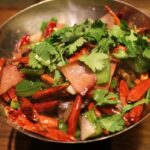Achieving optimal muscle gains is a multifaceted journey that involves rigorous training, adequate rest, and, most importantly, a well-balanced diet rich in protein. Protein is a fundamental macronutrient that plays a pivotal role in muscle repair, growth, and overall fitness. In this comprehensive guide, we will delve into the importance of protein for muscle development and explore a variety of protein-rich foods that can help you maximize your gains.
Understanding the Role of Protein in Muscle Gains
Protein serves as the building block for muscles, and consuming an adequate amount is crucial for anyone looking to enhance their muscle mass. When you engage in resistance training or other forms of intense physical activity, your muscles experience microtears. Protein is essential for repairing these microtears and promoting muscle hypertrophy, the process through which muscles grow larger and stronger.
Recommended Daily Protein Intake
The amount of protein needed varies based on factors such as age, gender, weight, and level of physical activity. However, a general guideline for those aiming to build muscle is to consume between 1.2 to 2.2 grams of protein per kilogram of body weight. It’s essential to spread protein intake throughout the day to support a continuous supply of amino acids for muscle repair and growth.
Protein-Rich Foods for Muscle Gains
- Lean Meats: Lean meats such as chicken, turkey, and lean cuts of beef are excellent sources of high-quality protein. They provide essential amino acids necessary for muscle protein synthesis without excessive saturated fats.
- Fish and Seafood: Fatty fish like salmon, tuna, and mackerel are rich in protein and omega-3 fatty acids. Omega-3s contribute to overall health and may support muscle recovery by reducing inflammation.
- Eggs: Eggs are a nutrient-dense protein source, containing all essential amino acids. They are also rich in vitamins and minerals, including B vitamins and choline, which play roles in muscle function and energy metabolism.
- Dairy Products: Greek yogurt, cottage cheese, and milk are rich in casein and whey proteins. These dairy proteins are absorbed at different rates, providing a sustained release of amino acids to support muscle growth.
- Plant-Based Proteins: For those following a vegetarian or vegan diet, plant-based protein sources like tofu, lentils, beans, and quinoa can be excellent choices. Combining different plant-based protein sources ensures a diverse amino acid profile.
- Nuts and Seeds: Almonds, peanuts, chia seeds, and hemp seeds are not only rich in protein but also provide healthy fats. They make for convenient and satisfying snacks that contribute to muscle recovery.
- Protein Supplements: Whey protein, casein protein, and plant-based protein supplements are convenient options for individuals struggling to meet their protein requirements through whole foods alone. They can be consumed as shakes or added to meals.
Tips for Maximizing Protein Absorption
- Timing is Key: Distribute protein intake evenly throughout the day, with a focus on consuming protein-rich meals and snacks around workouts to support muscle recovery.
- Hydration Matters: Staying well-hydrated is crucial for optimal protein utilization. Water is essential for various physiological processes, including those related to muscle function.
- Combine Proteins: Pairing different protein sources in a meal, such as combining beans and rice or yogurt with nuts, ensures a broader spectrum of amino acids, enhancing overall protein quality.
Conclusion
In conclusion, maximizing muscle gains involves a holistic approach that includes targeted training, adequate rest, and a well-structured diet rich in protein. Understanding the role of protein in muscle development and incorporating a variety of protein-rich foods into your diet can significantly contribute to your fitness goals. Whether you prefer animal or plant-based sources, making informed choices about your protein intake is a key step toward achieving the ultimate gains in muscle mass and strength.









